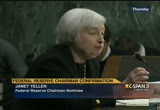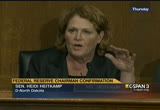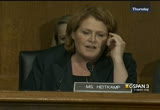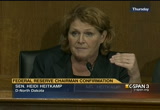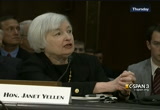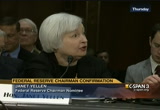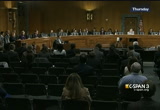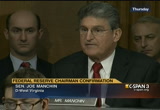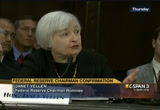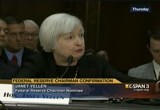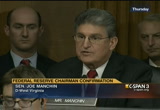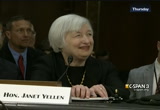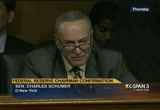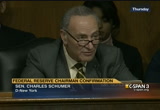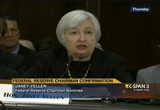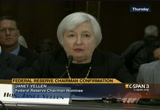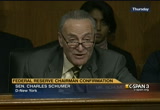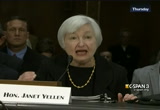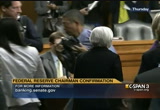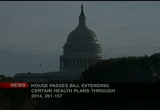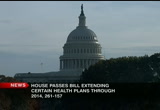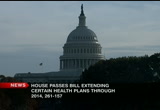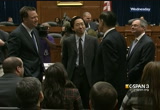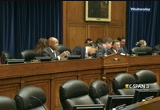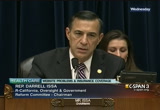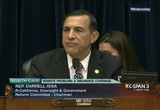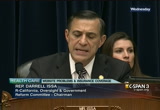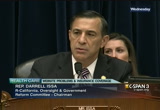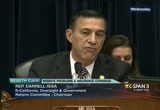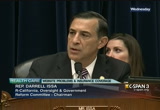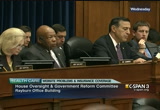tv Politics Public Policy Today CSPAN November 15, 2013 2:59pm-3:30pm EST
2:59 pm
college and hope to be able to put their skills to work finding good jobs and entering the job market when it's strong. i think when those people who worry about our policy thinking about themselves as savers take into account the broader array of interests they have in a strong economy, they would see that these policies, even though they may harm them in one respect, are broadly beneficial to them as i believe they are to all americans. >> my time is expired. thank you, mr. chairman. >> thank you. senator heitkamp. >> thank you, mr. chairman, and thank you, dr. yellen, for hanging in there with us. those of us at the end of the desk would love an opportunity to ask you some questions as well. i want to get back to the fed goal of full unemployment. i want to ask quick questions. give me a number on what you consider full unemployment -- or
3:00 pm
employment. >> so i don't have a precise estimate, but every three months all of the participants in the fomc fill out a survey and indicate what they think the normal longer run level of unemployment is. in our most recent survey in september, the range of opinion was 5% to 6%. >> okay. tell me, what do you believe the real unemployment rate is today? >> well, the measured unemployment rate is 7.3% -- >> i know the measured unemployment rate. that wasn't my question. >> as we've discussed previously, we have very high incidents of involuntary, part-time employment. we have all too many people who appear to have dropped out of the labor force.
3:01 pm
>> i don't want to belabor this committee hearing any longer than what i have to. would you agree that it is at least close to or probably over 10%? >> certainly by broader measures, it is that high. >> would you also agree that right now in america, we have the greatest income disparity that we have had since the great depression, right before the great depression? >> we've had widening wage inequality and income inequality in this country going back to the mid to late '80s, and that continues. >> so i just want to take a moment to speak for maybe those folks who are on the lower end who look at the fed policy and look at the stock market, don't have a stake as they see it, as you just explained to senator johanns. we all have a stake, but their day to day, they don't see a stake. they don't see their economic condition getting any better. certainly they don't see their employment opportunities getting any better, especially for those with low job skills. i won't say low education but
3:02 pm
low job skills. so what can you do or what have you done to address income disparity, unemployment disparity in this country and what would you suggest that the fed pursue to avoid the consequences long term of that income disparity? >> senator, i think you're asking about something that is a very deep problem that's afflicted the u.s. economy and other advanced economies. economists who have spent a lot of time trying to understand what's responsible for widening inequality, and many of the underlying factors are things that are outside of the federal reserve's ability to address. >> do you believe your policies have added to the problem? >> i believe that the policies we've undertaken have been meant
3:03 pm
to generate a robust recovery. i would like to see the u.s. economy and the job market recovering more rapidly than they are, but i believe our policies have helped. and i think, as we saw during the 1990s when we still had trends toward widening inequality, we did have real wage gains, and we did have a reduction in inequality when we had an exceptionally strong and getting ever stronger job market. so faster growth in the united states is going to help a stronger job market. you know, when the economy recovers, we're going to see firms be more willing to undertake training when they can't find workers, they're going to be willing to invest in people, to hire, to make capital investments that will make workers more productive when they're on the job and we'll see
3:04 pm
greater wage gains. >> just a final comment. i would suggest that those at the bottom aren't feeling the effects of these policies. the trickle down hasn't happened for them. so they struggle every day, and they may not see their wealth grow because they don't hold a lot of assets. so anything that you can do, taking a look at this broader issue, because this is an issue that will affect the american economy for years to come and effect our competitiveness in years to come. they're the consuming class. when you look at why consumers aren't consuming, because we aren't getting resources to those who do consume. i thank you for your willingness to serve and look forward to a long relationship with you. >> thank you, senator. >> senator manchin. >> thank you, mr. chairman. thank you, ms. yellen. i enjoyed our visit. you've done a great job today. let me say this. i look at you and think there's a person who was involved the
3:05 pm
last time we had a balanced budget, the last time that we would have been on track to be debt free. if you go back to those days, i'm sure there was naysayers then saying we couldn't do it. never happen. but y'all did it. and then we went off the tracks. what i'm asking is how we get back on the tracks. i know quantitative easing, you and i have a difference of opinion on this or concern. you have a broader view of what has worked and not worked around the world. i think we spoke about japan and why you believe that what we're doing needs to be done. i would only say this. if $85 billion a month in quantitative easing has not really given us the results that we desire, why wouldn't you recommend doing $200 billion a month? you know, why just 85? we know that hasn't worked. of course, i have concerns with continuing it because i don't
3:06 pm
think -- i think senator johanns had said, we're on a sugar high. the bottom line is, you all have done your job. you've done everything possible to prop up this economy. we have failed miserably as congress to do our job. to me, to get even a budget -- we don't have a budget. then to say that we could have a balanced budget, people think we're crazy. it can't happen. it'll be too harmful, a balanced budget. those of us who are governors and come from the executive branch, that's all we understand. we had to by law. and then to even think that we could be debt free in the next generation or beyond, do you think those are impossible or unreachable goals? >> well, senator, i feel achieving debt sustainability
3:07 pm
over the medium term for this country is an exceptionally important goal. >> can we balance the budget again? >> it requires very tough decisions, as you know. >> you made decisions back in the '90s. i remember the dialogue then, couldn't be done. >> well, we did make tough decisions. congress and the administration made very tough decisions in the '90s. they did it in a way that i would think would set a model in a sense for this congress. when president clinton was elected, the economy was -- had high unemployment. it was just beginning to recover. the administration and congress wanted to achieve deficit reduction, but to do so in a way that wouldn't harm the economic recovery. so they agreed on a set of tax increases and spending cuts, not all of which came into effect immediately but were phased in over time. there had been at that time a lot of uncertainty among
3:08 pm
businesses and in the markets, among households about whether or not the government would ever balance its budget. the response was very positive. long-term interest rates came down. now the fed had scope to use monetary policy to offset any adverse impact on the economy, but we really didn't see a lot of adverse impact because the fiscal tightness was phased in over a period of years. the economy enjoyed a long and robust boom. >> let me just say this. you having that experience and lived through it, worked through it and was successful with it, we have the utmost respect for the reserve, yourself, and i'm sure you see the committee has the utmost respect for you. we just need you to speak out and help us a little bit more
3:09 pm
and challenge us to do our job. if people like yourself are in the know and unwilling to challenge us, i'll guarantee you we don't have the political will it seems like to do what needs to be done. we have got to get our financial house in order. every citizen in america has to face a budget. every one of them has to live within that budget. we're unwilling to make that difficult decision. we're not only on a sugar high, we're going to go into a sugar shock pretty soon. that's what i've been talking -- but unless we hear the unbridled truth from people in the know, people who have been there. they said you couldn't do it, and you did it. it's not like it's the impossible dream. we've had budgets, haven't had one for five, going on six years. we've balanced budgets, and we've had surpluses. i'd like to get back to that again. i think people like yourself can help us be steered in that direction. so be bold. >> thank you. >> be bold. >> thanks. i appreciate that. >> senator schumer. >> hi.
3:10 pm
thank you, madam chair and thank everybody. i just want to follow up first on a question that heidi heitkamp talked about. i agree with senator manchin that the deficit is a serious problem. it's less of a problem than it was a year or two ago. i know you acknowledge that, but it's not our greatest problem. our greatest problem is that middle class incomes are declining in america for the first time in american history, in my judgment, in terms of our political economy. the amazing thing is they decline not just because of the recession but they actually declined between 2001 and 2007. serendipitously, if that's a word, the person who alerted me to this attention was a professor at harvard law school named elizabeth warren, who wrote articles about this long -- long before being a senator was a gleam in her eye. but it's our most serious problem. if middle-class incomes continue to decline -- they've declined close to 10% between 2001 and today, this is going to be a different america.
3:11 pm
i tell this particularly to business executives i meet. i get to new york. what's all this populism about? well, i say, you know, the american people are a generous people. they don't mind if the people at the top income goes up 20% if theirs goes up 3 or 4. when theirs starts going down, it's a different story. we've never that in america. my question to you is, how concerned are you about this, what impact will it have on growth and our economic potential, and does the fed have tools to do this? i understand this relates to some of my republican colleagues' skittishness about continuing some policies that maintain growth. i do think given the seriousness, at least which i regard this problem, that the fed has really a dual mandate, which i know you observe, which is not simply keeping inflation down and not simply monitoring the budget deficit and its effects on our economy but in
3:12 pm
trying to get jobs and middle-class incomes back up again. it's so serious and frankly no one gives it the attention it needs. so it's your -- >> well, senator, i want to echo my agreement with you that this is a very serious problem. it's not a new problem. it's a problem that really goes back to the 1980s in which we have seen a huge rise in income inequality with, as you said, for many, many years the middle and those below the middle actually losing absolutely. frankly, a disproportionate share of the gains. it's not that we haven't had pretty strong productivity growth for much of this time in the country, but a disproportionate share of those gains have gone to the top 10% and even to the top 1%. so this is an extremely difficult, and to my mind very
3:13 pm
worrisome problem. there is a lot of research, a lot of debate about exactly what the causes of this problem are. perhaps having to do in part with the nature of technological change, with globalization, with institutional changes in the united states, including the decline of unions. but there are many things that are involved in this problem. what can the fed do? we can't change all those -- all of those trends. the solutions involve a multitude of things, including education, maybe early childhood education, job training, other things. but what we can do is try to achieve, as we are, a robust recovery so that we create jobs, we have a stronger job market, and in a stronger job market, people who are having a lot of trouble getting jobs will be
3:14 pm
drawn into jobs. they'll get better jobs. there will be more training. people will move up job ladders, and opportunities will increase. it's not going to put an end to the problems these long-term, structural problems that are driving this, but it will be helpful, and i think it's the contribution the federal reserve can try to make. >> just related to that but in a specific, some of my colleagues have criticized you for keeping rates, quote, artificially low. but isn't the zero lower bound on the short-term interest rates in some way also artificial? let's say rates were 5% today. we had high unemployment, very low inflation. wouldn't you lower rates? and isn't qe-2 just another way to influence interest rate when is you get close to the zero mark? so if you didn't do qe, wouldn't real interest rates be artificially high, so to speak?
3:15 pm
>> i think that's fair, if you judge what's high or low by the needs of the economy. people sometimes talk about a concept called the equilibrium. what's natural given the levels of saving and investment in the economy when there's a lot of saving and not very much investment, which is where we are now in a weak economy. the natural forces of the economy are pushing breast rates down. it is these forces that we're trying to go with to -- if we were to try to push rates up when the economy has that much saving and such weak investment, we would harm -- we would truly harm the recovery. of course, having pushed rates to zero, according to many estimates, we would ideally have negative short-term interest rates. of course, we can't achieve that. as you indicate, that's why
3:16 pm
we're trying to push down longer term interest rates. >> i think you'll make a great chair, and your brooklyn wisdom shines through. >> thank you very much. i never forget my roots. appreciate that. >> thank you, dr. yellen, for your excellent testimony. i ask the members of this committee to submit any written questions for the record for dr. yellen by close of business tomorrow. dr. yellen, please respond promptly so that the committee may proceed to a mark up as soon as possible. this hearing is adjourned.
3:18 pm
measure to allow insurers to sell individual health policies in 2014 that were in effect as of january 1st, 2013. epa if they don't meet the minimum coverage requirements set by the president's health care law. the vote on the bill was 267 to 157. the associated press writing about today's house action saying that republicans renewed an assault on the health care overhaul and his own credibility on friday as they pushed toward house passage of a measure to let insurers keep offering health coverage that falls short of the law's standards. from the associated press, a day earlier the president changed course in the face of public uproar and said he would take administrative action which does not meet approval to let companies continue selling such plans for at least another year. unlike the house gop bill, he
3:19 pm
would permit such sales to insurer's existing customers only not new one. the white house said thursday the president plans to veto gop legislation. then again from the associated press. you can see today's debate in the house in our video library at c-span.org. earlier this week the white house chief technology officer todd park was on capitol hill talking about efforts to fix healthcare.gov. park, who was subpoenaed by the committee stressed a talented, dedicated team of public servants are working around the clock. tech officials with the health and human services department, insertion for medicare and medicaid services, omb and government accountability office, two former chief government information officers, richard spires and karen evans also and before the committee. representative darrell issa
3:22 pm
>> the committee will come to order. the oversight committee exists to secure two fundamental principles. first, americans have a right to know the money government takes involuntarily from them is well spent. second, americans deserve an efficient, effective government that works for them. our duty on the oversight and government reform committee is to, in fact, protect these rights. our solemn responsibility is to hold government accountable to taxpayers because taxpayers have a right to know the money government takes from them is well spent. it's our job to work tirelessly with citizen watch dogs to
3:23 pm
deliver facts to american people and bring genuine reform to federal beaurocracy. three and a half years ago, closer to four, in a partisan vote, the house of representatives passed the patient protection affordable care act, commonly referred to as obama care. the act gave this administration more than three years to implement, gave them virtually unlimited money, ensured them for all practical purposes they need not come back to congress ever again because it created an entitlement. one that raised its own money, spent its own money, created its own rules. the 2400 pages that were passed into law and read afterwards now represent tens of thousands of
3:24 pm
pages of regulations created by this administration based on how this administration wanted a law interpreted, meaning that legislation created three and a half years ago was still being written in late september. the cornerstone of the president's signature achievement included a website, healthcare.gov. this site and parallel sites created by some states, were supposed to make it easy to have an online marketplace. it was, in fact, an attempt to depp indicate what hundreds, perhaps thousands, of insurance companies large and small around america do well every day. on october 1st, president obama said, using it would be as easy as buying an airline ticket on
3:25 pm
kayak.com or buying a te television. this is an insult. on the day of the launch, president obama should have known the harsh lesson we have all known since that time. that was they weren't ready. they weren't close to ready. this wasn't a small mistake, this wasn't a scaling mistake, this was a monumental mistake to go live and effectively explode on the launch pad. for american people obama care is no longer a distraction, and it is a lot more than a website. for millions of americans it's about losing insurance the president promised you can keep, period. for many americans it's about premiums going up when you were promised they would go down by
3:26 pm
$2500. big businesses lobbied and received an obama care waiver this year. however, the individual, the taxpayer, the citizen, the only real recipient of health care did not. individuals still have to pay a penalty if they don't have insurance that meets a federal standard, a standard of what your government, your nanny state believes, in fact, you must have. the penalty is still in effect. even if new exchanges don't function, the penalty is in effect even if you planned on keeping the health care you wanted, period, and discovered it is now gone or have yet to discover is ultimately if you're on an employer plan, you may not yet have found out your employer either cannot afford or cannot receive the health care you've
3:27 pm
grown accustomed to. the specific reason we're here today is a narrow part of this committee's oversight and legislative authority. it's, in fact, to examine the failures of what should have been an i.t. success story. nearly $600 million, three and a half years, is larger than kayak ever dreamed of having to set up their websites. it's larger than ebay spent in the first many years of a much more complex site that auctions in realtime millions and millions of products a year. we're here to examine a failure of technology not because the technology was so new and innovative, not because this was a moonshot, not because we needed lockheed martin and rockwell to coin and in vent some new way to propel a ship to
3:28 pm
the moon but because we have discovered, and will undoubtedly continue to discover, that efforts were taken to cut corners to meet political deadlines at the end. that for political reasons rules were not created in a timely fashion. that in fact, the rules that should have been created at the time of the passage of the law, or shortly thereafter, enmany cases were still being given to programmers in september of this year. now, i recognize there are divisions on this committee as there were when obama care became law. many members, including myself believe there was and is a health care crisis in america. it's a crisis of affordability. insurance is simply a way to score what that affordability is, not to drive down the cost. many members, including myself, opposed this new law because we thought it wouldn't work and it
3:29 pm
had no systems to actually reduce the cost of health care from the provider. my friends on the other side may correctly note, as i will here, that many americans are benefiting from obama care at the cost of trillions of dollars over a 10-year period, i certainly hope so. but divisions over whether or not taxpayer money taken and pushed back out to needy, who are trying to afford health care, is not the subject today. unfortunately during the first two years of the obama care law under speaker pelosi, there was no effective oversight. oversight was shut down during the first two years of the obama administration and the minority pointing out anything was ignored. you said my chairman we have tried to correct that. we have been disappointed
105 Views
IN COLLECTIONS
CSPAN3 Television Archive
Television Archive  Television Archive News Search Service
Television Archive News Search Service 
Uploaded by TV Archive on

 Live Music Archive
Live Music Archive Librivox Free Audio
Librivox Free Audio Metropolitan Museum
Metropolitan Museum Cleveland Museum of Art
Cleveland Museum of Art Internet Arcade
Internet Arcade Console Living Room
Console Living Room Books to Borrow
Books to Borrow Open Library
Open Library TV News
TV News Understanding 9/11
Understanding 9/11